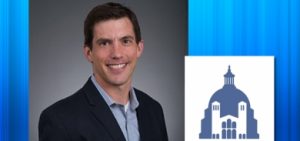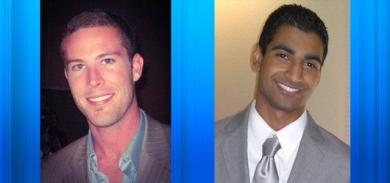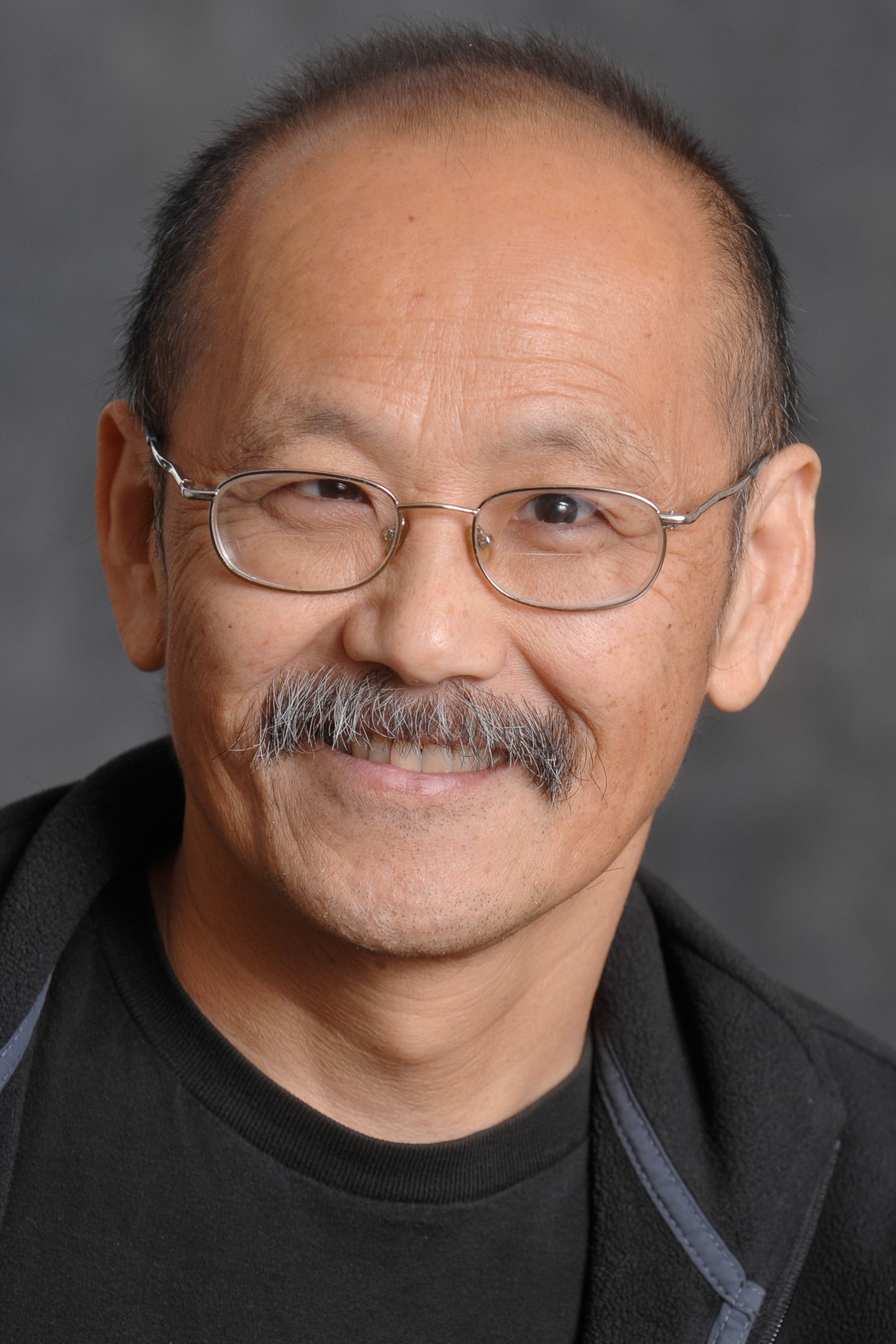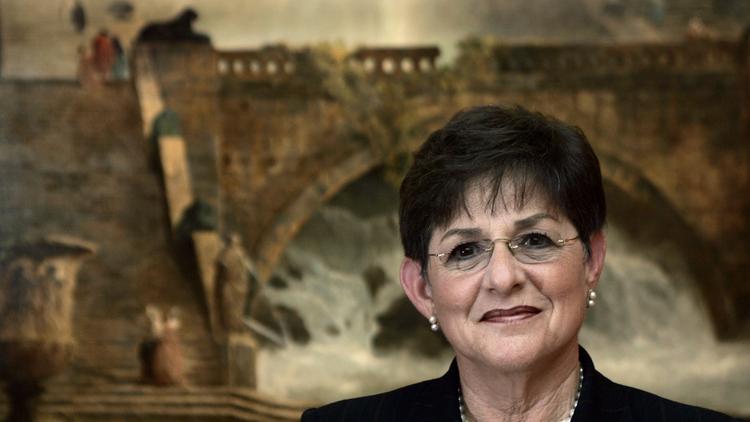Tune in to the Oprah Winfrey Network on Monday nights and you might see Public Policy alumna Snejana Daily (MPP ’12) building a house in post-earthquake Haiti, working on a community center in a war-torn Colombia neighborhood, or digging water wells in a Tanzanian village – all part of a new show called “Operation Change.”

The 10-part series, which airs on OWN, follows the founders of the Starkey Hearing Foundation – Bill and Tani Austin and their son Steven Sawalich – as they travel to the world’s most impoverished countries to give people hearing aids and partner with local organizations to empower and improve communities around the world. The documentary series tells the stories of people facing challenges across the globe, and highlights the work of agencies hoping to make a difference. Along with the Austins and Sawalich are two volunteers who assist with the projects – Daily is one of them.
For Daily, participating in the show, which took her to 13 countries over the course of a year, meant the possibility of delaying graduation from her policy program. But it also meant fulfilling a life purpose.
“There was an email sent out — I’m assuming to the whole cohort — and the subject line was ‘Amazing opportunity but may delay graduation,’” Daily recalled. “I was probably the only crazy person who opened it, but I knew this was everything I ever wanted to do. I was determined to get this position and to graduate on time.”
In the email were details of an open casting call for a show that would send chosen participants to different countries to help fit hearing aids and partner with local non-profits. The show was hatched by the Starkey Hearing Foundation and the Clinton Global Initiative, which challenged Starkey to expand their pledge to give 100,000 hearing aids per year around the world, to something that could have greater visibility and impact.
After several rounds of rigorous auditions and interviews, Daily was picked to be part of the show. Her official title was “Starkey Volunteer,” but her role was to complete projects in each country, interface with the community, research the places, learn what it’s like to live in those places, and then tell that story on camera.
“They were looking for people who were passionate about making a difference in the world, inspired by other cultures, eager to learn about other places and people, and then be able to speak to the issues whether cultural or political,” Daily explained, adding that she was also an attractive candidate because she was a MPP student specializing in non-profit organizations.
Daily said the show was the perfect opportunity to take everything that she was learning in the classroom and see it in action. Professor Robert Jensen’s statistics class that covered studies on health in India came alive as Daily touched down in India and interfaced with displaced children. An interesting talk at the Luskin School of Public Affairs on the dynamics of Haiti after the earthquake became reality as she helped build a home in Jacmel, Haiti. Conversely, her education and work experience gave her the skills to be an effective member of the Starkey team with her ability to do research and understand what elements of a non-profit can work in different settings. More importantly, the year-long commitment gave Daily the opportunity she was looking for – to make an impact on the world.
Daily always knew that she wanted to do work that was “people-focused,” but it wasn’t until her husband, UCLA alumnus Lieutenant Mark Daily, passed away while on active duty in Iraq in 2007 that she decided she wanted to do work overseas. Daily was 21 years old at the time.
“While I was working at a Los Angeles-based non-profit my husband was deployed and passed away, and at that particular moment in time, I really got to reevaluate what I wanted to do with my life,” Daily said. “When you’re faced with your own mortality at such an early age, it makes things have a little more gravity. And I felt like I was still alive and he was such an epic human being that I had a responsibility to carry out his legacy as well as live for the both of us.”
It was then that Daily committed to living without any barriers. After spending time recovering from the tragedy, she began looking for organizations that would send her abroad – to live without boundaries and fears and to “make her life count.” She scoured the Internet for opportunities. She considered the Peace Corps. She enrolled in the UCLA public policy program, and then this project presented itself.
The first episode of Operation Change, which aired last month, opened on Haiti and followed the struggle of two Haitian families. Episodes in Israel and Palestine, Tanzania, Colombia and Lebanon have aired since.
Daily’s favorite experience was in Sevisa, Papua New Guinea, where she assisted in rebuilding a village destroyed by tribal warfare, built underground latrines, planted trees that were burnt down by a warring tribe, and helped harvest and sell coffee beans as part of assistance to a small business. She was also able to make a connection with the villagers that Daily said was extremely precious.
“The people were so open and welcoming and they have a tradition of holding hands if they respect you, so everywhere I went someone would walk with me and hold my hand. It was really beautiful,” Daily said.
In addition, the village was made up of mostly women and children, because many of the men had been killed as a result of 15 years of tribal warfare with a neighboring tribe.
“It was incredible to see a group of strong women step up to become community leaders and rebuild their lives in such a powerful way,” Daily said. “And, obviously, the other thing that we connected on was the idea that people all over the world experience the same pain. When you go through the tragedy of losing somebody, there’s just that unspoken understanding and connection and I felt like they just got it.”
Daily said the experience was “life changing,” and since her time on the show ended she has been working as a freelance producer on a genre of projects that she calls “socially conscious media.”
Her vision is to use technology and media to create a better world through educating people on how to support others. Her last project with a Nigerian filmmaker told the story of an activist speaking out against the effects of oil trade policy in Nigeria. In addition to organizing screenings of the film on college campuses and in Washington, Daily worked with lobbyist to firm up support for a resolution to acknowledge the effects of the oil trade in Nigeria to help move cleanup in a better direction.
“My strength is connecting the dots and telling the human story,” Daily said. “You can shift the dynamic of policy by working directly within the structure but you also need the support of people. Media raises awareness, catalyzes action, and works in support of policy change.”
Daily said she’s been enjoying reliving her experiences as the show, which was filmed two years ago, airs each week.
“There are definitely parts that I get to relive and it’s amazing having such an incredible, life-changing experience encapsulated,” she said. “I now have it forever to show my grandkids and prove that I was cool once.
You can catch up on past episodes by going to www.operationchange.com/. Blog posts written by Daily also accompany each online episode. New episodes air on Mondays at 10/9 central. There will be a special two-episode night of Operation Change on August 4. You can also follow along on social media by using #operationchange.
And, for the record, Snejana was able to graduate on schedule while participating in this amazing life journey, thanks to a lot of communication, extra effort and some flexibility from her UCLA Luskin professors.









